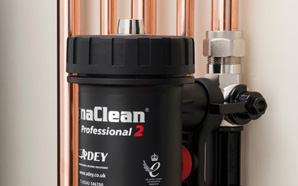

With boiler sales on the rise, Dr Neil Watson explains why now is the time for installers to educate customers, and how best to maintain an efficient system
The latest figures from the Heating & Hot Water Industry Council revealed that UK boiler sales rose by 18% in the first quarter of 2014, compared with the same period last year.
While this is good news for the industry at large, installers in particular have an opportunity to harness the business opportunities it could bring, especially as we move into the summer months.
Soaring energy costs led to as many as seven in 10 households (73%) going without heating at some point last winter, according to a report by price comparison website Uswitch. As such, an uplift in the installation of new boilers and the onset of warmer weather brings a timely opportunity for installers to encourage their customers to invest in simple heating system maintenance, which could help them save money when temperatures cool again.
However, according to research by Adey, one in 10 homeowners see having an annual service as an unnecessary expense and 20% only have their boiler serviced if they’re concerned it isn’t performing properly.
This suggests education is required for homeowners to understand the benefits of ongoing preventative heating system maintenance, such as year-on-year energy savings, prolonged boiler lifespan and more efficient operation.
Installers can help make this easier by equipping themselves with the best and most effective tools for the job. To prove homeowners can reap benefits from proper ongoing maintenance, installers should adopt a simple four-step best-practice approach to water treatment:
1. The introduction of a premium cleanser to the system
2. An effective system flush
3. Installation of an effective magnetic filter for ongoing maintenance and protection
4. Dosing the system appropriately with a quality inhibitor.
Once installed, a new boiler is obviously expected to be more efficient than the last, but anyone who thinks it’s a case of ‘fit and forget’ needs to think again. The best installers will help their customers understand that if a new boiler is fitted to a dirty system, its performance will immediately begin to decline from its A-rated peak.
To help give the new system every chance of long-term survival, installers should introduce a high-quality chemical cleaner and give the system a thorough cleanse to prevent old corrosion deposits, sludge and debris from causing damage in circulation. Adding a good chemical protector will then counter sludge generation.
Prevention is better than cure when treating older systems, but it can be easy to underestimate the value of ongoing chemical water treatment. Some professionals may believe that adding cleaners and corrosion protectors to the primary water is purely about protecting the base metals within the boiler, but good quality chemical water treatment plays an important part in improving the overall energy efficiency and performance of the heating system, no matter what the age of the system.
Choose carefully
Installers should use chemical protectors with BuildCert CIAS approval, as these will ensure the minimum level of product performance is met. However, they should be aware that even with this accreditation, some chemicals on the market might not have been tested outside of laboratory glassware.
To ensure good product performance, installers must do their homework and know what they’re buying. For example, Adey’s protectors have to pass more than 20 separate performance tests inside and outside laboratory conditions before reaching the market.
It’s the same scenario with the raft of different magnetic filters available. Savvy installers will recognise the differences between them, and crucially those that use magnetics for filtration and those that use a magnet merely for sludge retention once filtered.
The three factors installers should consider when choosing a filter off the shelf are size, capacity and performance.
Installers need to look for filters that are proven to collect and remove virtually 100% of damaging black iron oxide sludge from the system. First-pass performance and non-magnetic debris retention are also crucial factors in helping to maintain long-term optimum efficiency.
Results show that the most effective magnetic filters, such as MagnaClean, can cut household heating bills and carbon emissions by up to 6% year on year, reduce system maintenance call-outs by up to 37% a year and help increase the life of the boiler beyond the industry accepted lifespan of 12 to 15 years.
Crucially, to get the very best results from any heating system, neither filters or chemicals should be used in isolation. The drive to be more energy efficient has made the margins of performance so critical that any contamination of the cooling water in a boiler can drastically affect output and bills. To achieve the best performance from any system, magnetic filtration should sit at the heart of a comprehensive water treatment programme.
Dr Neil Watson is technical director at Adey
If you'd like to keep up-to-date with the latest developments in the heating and plumbing industry, why not subscribe to our weekly newsletters? Just click the button below and you can ensure all the latest industry news and new product information lands in your inbox every week.